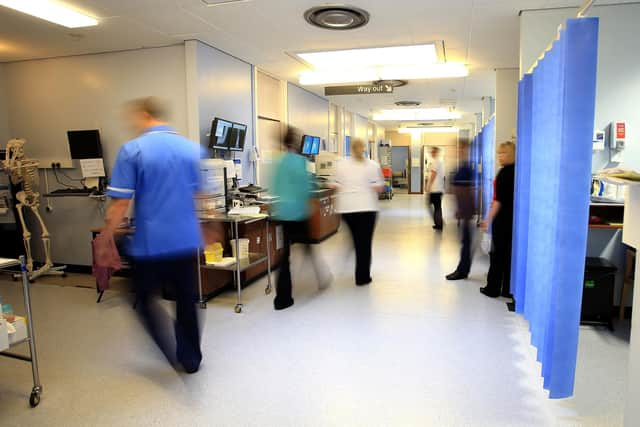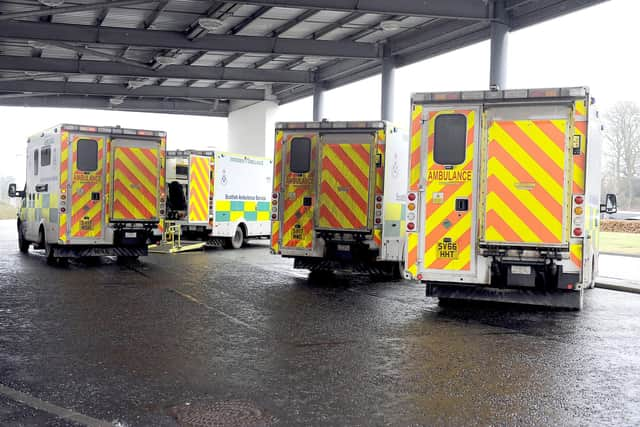NHS Scotland crisis: 80-plus hour waits, tens of ambulances waiting outside and skyrocketing deaths - how A&Es have experienced 'total collapse' over festive season
Scotland’s accident-and-emergency (A&E) departments have experienced “a total collapse” over the festive season, according to NHS medics, with waits of more than 80 hours being experienced, tens of ambulances “stacked up” outside an emergency department and excess deaths skyrocketing.
According to Public Health Scotland, just 60.8 per cent of people who attended A&E in the week to December 31 were seen within the target time – a sharp fall from 65 per cent the previous week.
Advertisement
Hide AdAdvertisement
Hide AdHowever, NHS Scotland professionals are warning the following week’s statistics – from January 1-7 and due to be published next week – are set to be even worse.


The number of people waiting more than 12 hours during the week to Hogmanay rose by almost a third, from 964 to 1,271. The number waiting longer than eight hours also climbed from 2,584 to 3,178.
The Royal College of Emergency Medicine (RCEM) has calculated there will be an excess death for every one in 72 patients who spend between eight and 12 hours in an emergency department. The RCEM has estimated that last year, 1,635 Scots died needlessly due to A&E pressures, with 50 excess deaths being recorded a week during the worst winter pressures.
Dr John-Paul Loughrey, vice-president of RCEM Scotland, said at some emergency departments in Scotland, just 20 per cent of patients are being seen within the Scottish Government’s four-wait target.
“The next set of data [week commencing January 1] we'll see will encompass departments being under pressure like no one has ever seen before,” he said. “Some places are seeing less than 20 per cent of patients discharged against the four [hour] standard, patients with 80-odd hour waits at emergency departments for acute beds and upwards of 30 ambulances stacked up outside some of our hospitals.


“What we will see in the next week's data is a reflection of that, and there was a near complete collapse of performance. There can be no quality of care provided in those circumstances. It’s purely firefighting.”
Dr Loughrey said many NHS workers were now looking for “exit plans”, warning of “people leaving shifts in tears” in a situation that threatens to exacerbate staffing problems.
Dr Lailah Peel, an A&E doctor working in Glasgow and an organiser for the British Medical Association medical union, said “the last thing” she would want “is for any of my loved ones to be in A&E”.
Advertisement
Hide AdAdvertisement
Hide Ad“To put it in perspective, imagine your Granny or another elderly relative needing to go to A&E,” she said. “You call an ambulance, that ambulance is going to take longer to come out.


“Then they're going to sit in that ambulance outside of A&E for however many hours, and they're going to eventually come in and they might sit in a corridor for however many hours, and then they'll get seen by a doctor and then they'll be waiting on a trolley for another however many hours.”
Dr Peel said the Scottish Government seemed less concerned than during last year’s winter crisis, despite conditions being just as bad.
“It’s been two-and-a-half years of this,” she said. “Last year, Nicola Sturgeon was making announcements on the seriousness of the situation, but now we’re having to try and get the word out. It feels like nothing has changed.”
According to Dr Loughrey, the RCEM frequently hears of record-breaking waits in Scotland’s A&E departments. “The worst I've heard, reported from a colleague of mine, is of an 83-hour wait for a patient who attended an emergency department,” he said.


“Another hospital reported that they had 30 ambulances parked outside waiting to hand patients over. That gives huge alarm bells that those ambulances can’t attend to the next group of patients in the community who require their help.”
Dr Peel added: “We've had a few patients that have deteriorated whilst in A&E, in part because we can't give them the attention that they need, because we're managing three times as many patients as we should have in the department.”
Some health boards have had to suspend scheduled surgeries. In NHS Borders, “no routine elective inpatient operations are being undertaken due to extreme pressures”, while NHS Lothian has had to issue updates to patients four times this year to inform them hospitals are experiencing increased pressure.
Advertisement
Hide AdAdvertisement
Hide AdHealth secretary Michael Matheson said the winter pressures in the health service were “not unique to Scotland”.
“Although we are seeing a slightly better performance than this time last year, particularly in terms of the number of long waits, we absolutely recognise that the system remains under pressure, and waiting times are longer than we want them to be for some patients,” he said.
“We are determined to provide boards with the support they need to manage continued seasonal pressure on services.
“Our winter plan is supporting boards to maximise capacity to meet demand and the expansion of Hospital at Home services is already helping more people receive care at home or as close to home as possible, where clinically appropriate, which aims to relieve pressure on the front door of our A&Es.
“Hospital bed occupancy continues to be a major factor impacting on performance. To address this, the delayed discharge and hospital occupancy action plan is being implemented at pace, delivering actions we know work to ensure patients receive the right care in the right setting.”
However, Scottish Liberal Democrat leader Alex Cole-Hamilton said the NHS had been left in a “perilous position as we enter 2024”.
“It’s clear now that Humza Yousaf’s NHS recovery plan has failed,” he said. “NHS staff have been sounding the alarm for months, but the SNP just hasn’t been listening. Staff are working flat out and getting burnt out because they simply don’t have the beds, safe staffing and resources they need.”
Scottish Conservative health spokesman Dr Sandesh Gulhane said it was “shamefully predictable” the final waiting times figures of 2023 were “utterly disgraceful”.
Advertisement
Hide AdAdvertisement
Hide AdHe said: “The discredited and distracted health secretary Michael Matheson spent the year miserably failing to get a grip of the crisis engulfing A&E departments across the country, after inheriting chaos from his predecessor Humza Yousaf.”
That more than one third of patients were left waiting more than four hours remains the “shocking norm”, Dr Gulhane said.
“We know these excess delays inevitably lead to tragic and avoidable deaths,” he continued. “These awful figures occurred even when attendance levels were at their lowest level since February.
“That sums up how Michael Matheson has failed to support my dedicated colleagues on the front line.”
Scottish Labour deputy leader, Dame Jackie Baillie, added: “As 2023 ended, we were left with an A&E system in utter disarray and thousands of Scots experiencing long and dangerous waits. We simply cannot have a perpetual crisis in our NHS with patients and staff paying the price of government inaction.
“Our A&E staff have worked tirelessly over the holiday period to treat those in need of care, but they are being left high and dry by an SNP Government more interested in playing fantasy politics than dealing with the crisis in our NHS.”
Comments
Want to join the conversation? Please or to comment on this article.